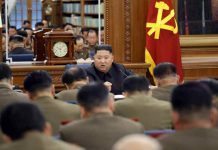The South Korean administration announced on the 26th that it would join the Proliferation Security Initiative (PSI), which South Korea had delayed joining due to factors in inter-Korean relations, the Hyundai Asan employee issue and the other pending complications. This firm move to sign up is a clear countermeasure against North Korea’s second nuclear test and short-range missile launches.
Spokesperson for the Ministry of Foreign Affairs and Trade (MOFAT) Moon Tae Young stated this morning, “The administration has decided to join the PSI on May 26th in order to cope with serious threats to world peace and security which are being caused by the proliferation of weapons of mass destruction (WMD) and missiles.”
◆ Is it now possible to block North Korean proliferation of nuclear and missile technology?
The PSI allows for stopping and searching vessels or airplanes suspected of carrying nuclear, biochemical or other WMD weapons, parts or technology.
Institute of Foreign Affairs and Security Professor Yoon Duk Min claimed, “The PSI is the international control system for impeding the development of North Korea’s nuclear technology. Now, South Korea will be able to take part in international moves against the proliferation of WMD.”
Professor Yoon added, “North Korea was not able to develop nuclear weapons and missiles by itself. Therefore international regulations are necessary to control the proliferation of such weapons. Although it is late, joining it is a good thing.”
South Korea needs to share information through the PSI so international cooperative efforts can help to restrict developments in missile technologies such as the miniaturization of nuclear warheads or enhancements to missile control systems.
In reality, however, South Korea joining the PSI has as much of a symbolic as a practical effect.
Vice Director of the Korea Institute for Defense Analyses Kim Tae Woo pointed out that the PSI has limited value in the case of South Korea because, “The Inter-Korean Maritime Agreement is in force, and armed collisions between North and South can occur, so South Korea cannot forcibly search suspicious North Korean vessels. Therefore, joining the PSI is a symbolic gesture.”
◆ Was now an appropriate time to join the PSI?
The South Korean administration confirmed its plan to join the PSI after the long-range missile launch of April 5th. However, Seoul delayed announcing the date for strategic reasons; so that the issue of Mr. Yoo, who is in detention in North Korea, would not be negatively influenced.
Professor Yoon said, “At the time of the missile launch, South Korea approached events flexibly in order to solve Kaesong Complex issues. But, this time, the South Korean administration could not find any good excuses to delay joining. It should have participated in it long ago.”
◆ How should South Korea cope with North Korea’s reaction?
There is no specific difference made by South Korea’s joining the PSI because it is an international cooperative system.
According to the Inter-Korean Maritime Agreement and other related international laws, the current system remains as it is; South Korea can search vessels that are suspected of carrying weapons or parts of weapons and are at anchor at South Korean ports or passing through South Korean waters.
North Korean vessels travelling in open seas cannot be searched and blocked under the PSI.
However, North Korea sees South Korea joining the PSI as a symbolic measure of South Korean hostility towards North Korea, so it is expected that the North Korean reaction will be aggressive.
Professor Yoon said, “We have to join it however much North Korea complains and reacts against us. North Korea conducted a second nuclear test; we cannot just sit by and watch.”
Vice Director Kim claimed, “The party which is threatening Korean Peninsula security is North Korea. We have to deal with them decisively.”




















